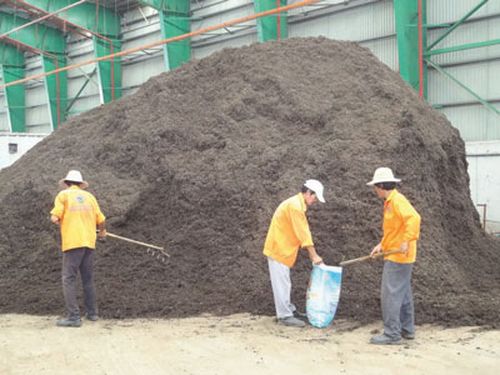

10/10/2016
According to surveys of the Vietnam Environmental Industry Association of 493 enterprises working in the environmental industry, the proportion of enterprises implementing waste treatment and environmental sanitation services measures up to 43%; of which state enterprises account for 7%, joint stock enterprises 24%, private enterprises 67%, other enterprises contribute the remaining 2%. In general, enterprises working in the environmental industry have many advantages such as high market demands, diverse human resources, yet the quality of services by these enterprises is not high, some works are ineffective. To support enterprises in the environmental industry to meet the demands of environmental services, which contribute to environmental protection while increase the contribution of environmental enterprises to the economy, the State needs to promulgate mechanisms and policies to create favourable and fair conditions for these enterprises to develop.
 |
| Compost Production from Waste in Việt Nam Waste Solutions Inc |
Roles of enterprises in environmental industry development in Việt Nam
In recent years, the economic growth has laid out conditions for manufacturing and commercial enterprises to develop rapidly. Therefore, goods and services by enterprises are significantly diverse, and quality of goods and services is improving, which meets fundamental consumption demands of the whole society.
However, the economic growth is also a cause of environmental pollution. To solve this problem, in the last few years, the Law on Environmental Protection and guide documents for implementation of the Law have been promulgated, which identify the obligations of enterprises in environmental protection. This is one of important content for the development of the environmental industry.
In the past, the collection, transportation and landfill of domestic wastes are mostlycarried out by state enterprises; however, currently, these enterprises are in the process of equitization. Models of environmental sanitation service joint stock companies are developing widespread in Hà Nội, Hồ Chí Minh city, Nha Trang... In addition, there are private company models such as Huy Hoàng Company (Lạng Sơn), Nam Thanh Company (Phan Rang), Hiệp Hòa Environmental Sanitation Service Cooperation (Bắc Giang), Ngô Mây (Bình Định)... These are effective models which are being up-scaled.
The collection, trading and recycling of scraps is a long-time profession in Việt Nam and is being considered as an economic activity that is effective and environmentally important. In addition to waste recycling enterprise types, hundreds of craft villages are operating in recycling scraps. However, it is necessary to control the operation of scrap trading and to control negative environmental impacts.
In recent years, the participation of enterprises in cleaner production has created many models on environmental protection. Typical examples are Xuân Đức Paper Company, Linh Xuân Paper Company, Phước Long Textile Company, Thuận Thiên Textile and Dying Company, Thiên Hương Food Company, Visa Factory, Nestle Company, Chanshin Company…
However, these above activities are “local initiatives”. Therefore, it is necessary to develop strategies, planning, plans at national, regional and provincial levels in the upcoming time. Bases on this, enterprises invest in the environmental industry.
Some recommendations to increase the role of enterprises in the environmental industry development
The State needs to consult enterprises when developing policies and legislations relating to environmental industry; to ensure the equality among enterprises; to create a favourable mechanism in environmental industry science transfer; to create financial incentive mechanisms (tax and fee reduction, soft loans), land… for enterprises working in the areas of environmental protection, manufacturing by-products, exporting environmental industry equipment and technology.
Furthermore, the State needs to have appropriate incentive policies for enterprises that use products and services of the environmental industry; to promote the establishment and development of the environmental industry market.
In the context of international economic integration, enterprises needs to enhance their self-reliance in developing production and commercial potentials through improvement and accession to modern technologies, access to advanced science and technology; creation of the trading environment and the product market, making use of scientific and technological linkage activities; creation of the linkage in the relationship among State - Scientists - Enterprises. Simultaneously, environmental protection should be identified as a corporate social responsibility; collaboration should be carried out with training institutes to develop good human resources for manufacturing activities of the enterprises.
Dr. Nguyễn Văn Phương
Hanoi Law University